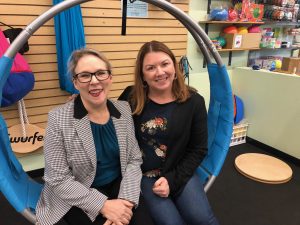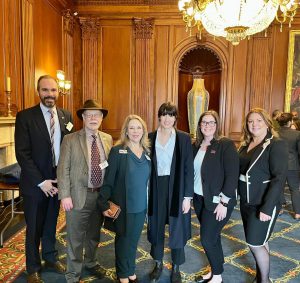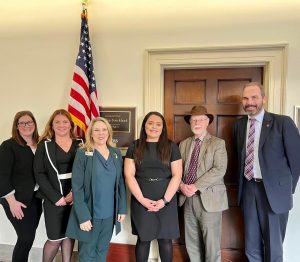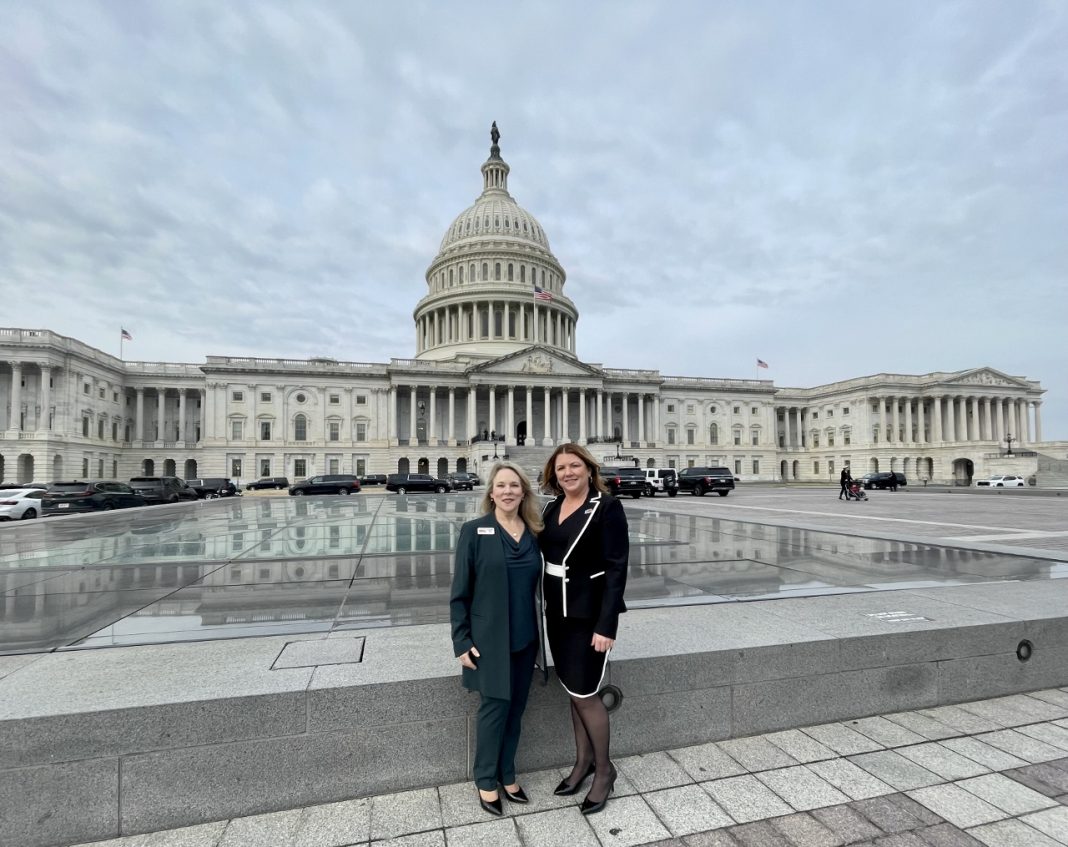Sensory Tool House, LLC in Lacey is more than a one-stop business for devices, clothing and programs geared to helping persons who are neurodivergent. Its CEO and founder, Katie McMurray, is also a champion of small businesses generally, thanks to her experience as a client of the Lacey/Olympia Small Business Development Center (SBDC). And in her recent meetings with Congressional members and their staff in Washington, D.C., McMurray had an opportunity to show why SBDC guidance and encouragement are critical to the success of local businesses like hers.

Sensory Tool House and SBDC Travel to the US Capitol
McMurray traveled to the United States Capitol at the invitation of SBDC Center Director Jennifer Dye. Dye says only a handful of other states bring small business owners to the annual meetings with members of Congress and/or their staff. “Washington always brings clients,” she says. “It’s meaningful to the senators and legislators. They remember them.”
Dye says she invited McMurray this year because of Sensory Tool House’s unique business model and McMurray’s efforts showing employers how to support employees who are neurodivergent
and how to provide reasonable accommodations. “We have worked with Katie for about three years,” says Dye. “She has an amazing story to tell. It is such a powerful story. She brings awareness to the community and teaches the importance of bringing in neurodivergent staff.”

“That was my message,” says McMurray. “Being able to talk about neurodiversity in the workplace – this is an issue.” In her blog, McMurray says, “neurodivergent refers to those who have a brain that diverges from the norm in ways that are either genetic, acquired, or innate.” She explains it can include persons who are autistic, have attention deficit disorders, Tourette’s, obsessive compulsive disorder, dyscalculia, dysgraphia, dyslexia and dyspraxia. It can also encompass acquired neurodiversity and mental health challenges.
Dye also says she wanted to demonstrate how a small business could open and even thrive during COVID-19, as Sensory Tool House did. “She took a big risk in opening a retail store during COVID, however with the research she was able to obtain by the SBDC Research Team, she was able to make an informed decision regarding the business’s feasibility.” says Dye.
McMurray says she spoke with Washington state’s Congressional members and staff about SBDC’s important assistance in launching Sensory Tool House and keeping it open. “It’s a place to go and present ideas and get feedback,” McMurray says of the SBDC. “They helped so many businesses pivot and reduce losses during Covid because people got help. It is invaluable what they do.”
McMurray, Dye and others from the WA state SBDC met with the offices of all 11 WA state U.S. Representatives and/or their staff along with the offices of U.S. Sens. Patty Murray and Maria Cantwell.
Sensory Tool House Assists Employers in Supporting Their Neurodivergent Workers

The Sensory Tool House team can help employers design a sensory friendly workplace. Support for employees can include sensory devices, office settings and strategies that provide a welcoming environment. “I have an incredible staff, and they are all neurodivergent,” says McMurray. “This population is grossly underemployed and unemployed, but they are the best employees. Studies from companies like JP Morgan, Microsoft, and others show there is a more than 90% retention rate and these employees are 30% more productive than their neurotypical counterparts.”
“The more knowledge about neurodiversity we can get in the workplace, the better,” she adds. McMurray says a workplace where employees feel comfortable in disclosing that they are neurodivergent, and having employers that create a safe environment, benefits both the employees and the business. “This is a skilled workforce and they are not being tapped into, and that has a trickle-down effect,” says McMurray. “I have the SBDC supporting me in developing this and working toward living wages for this population. Because of SBDC, we can go out into the community and support employers in employing those who are neurodivergent.”
SBDC’s Role With Local Small Businesses Such as Sensory Tool House

The SBDC helps businesses like Sensory Tool House grow and succeed through advising, education and research. Thurston County’s local SBDC is hosted by South Puget Sound Community College and is funded in part by the college and the U.S. Small Business Administration. SBDC helps businesses start, grow or buy/sell a business including providing one-on-one, confidential, no-cost advising on small business development, plus offering training and helping to find and analyze market data.
Dye says all states have a small business development center, and the SPSCC Lacey campus houses one of 28 centers that include over 40 advisors in Washington. “We are there to support and aid and we have resources,” says Dye.
The SBDC program also receives research assistance from Washington State University, which paid for the trip to the U.S. Capitol. The SBDC partners with SBA-funded programs such as the Washington Center for Women in Business and other organizations, and works collaboratively with SBA’s district offices and the Thurston County Economic Development Council to coordinate efforts.
Learn More About Sensory Tool House in Lacey
Sensory Tool House offers a wide range of supportive products for employers, the community and schools. Check out the website or visit the business to learn more.
Sensory Tool House, LLC
5831 Lacey Boulevard SE Suite J, Lacey
360.915.9457
Sponsored

















































